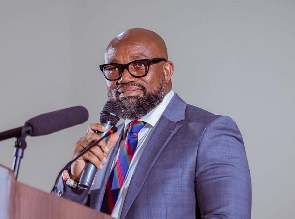Opinions of Tuesday, 10 January 2023
Columnist: Bob Manteaw
McDan and Ghana’s youth
Businessman Mr. Daniel McKorley, known popularly as McDAN, seem to talk too much about his success as a businessman and how he thinks the youth of today are not doing enough to be just as successful, or even better.
While he has every right to tell his story, flaunt his success and compare his experiences to those of our modern young men and women in the country, it has become repetitive and a repulsive habit of his to be overly critical of young people in Ghana.
From the youth sleeping too much, to the youth are not creative, not risk takers and not hardworking enough, these are some of the statements the businessman has made about Ghana’s youth at various opportunities.
Again, while he may be right in his criticism of the youth and while he is free to use his experiences as a basis to call for more youth drive and initiative, his constant barrage of negative commentary on the youth of today has become monotonous, discouraging and condescending.
It is almost as if he takes delight in foregrounding the situation of the youth and using the situation as an avenue to amplify his ego or what he sees as his accomplishments.
Even worse is the fact that Mr. McKorley bundles all young people together and assumes they all have equal opportunities, capacities, and capabilities and are failing to utilize them. He actually believes all young people are asleep.
In his criticism frenzy, Mr. McKorley fails to realize that the playing fields have never been all level, and more so today. Most young people may see opportunities but are circumstantially incapacitated to take advantage of.
If for nothing else, one would have assumed that if indeed Mr. McKorley came from the struggles of the so-called ‘streets’ and transformed himself against all odds, he would be better placed to understand and appreciate the roughness of that terrain and not be quick in assuming all can navigate such terrains with ease.
The Improbable Stories need to be Told
In his different discussions and criticisms of young people, Mr. McKorley has failed to encourage, motivate, advise, guide, and be realistic about the realities of today and acknowledge how different they are from those of his time.
As has become routine, of many, if not most of Ghana’s so-perceived ‘successful businessmen (no woman), Mr. McKorley never ceases to remind us about how he has come from the ‘streets’ and how he has worked against all odds to change his destiny.
Like all the other successful businessmen with improbable stories of accomplishments in Ghana, they only tell us about how they have escaped the ‘streets’ without giving the details of how that escape really happened.
Indeed, for most of such ‘successful’ business people, the rich details of their stories are muted or reduced to dull calculated, and illogical stories of chewing gum sales, a thousand cedi loan, and many such infantile stories.
In the end, the real lessons of their success stories are left out and untold. Those curious details of their moments of break, escape and transformation and the processes behind them are not told to serve as critical lessons and motivation for young people.
We admire Mr. McKorley’s interest in youth development. We encourage him to even do more; however, we advise him to reconsider his approach. The constant criticism is counterproductive.
He never misses an opportunity to tout how many people he has employed and of course, he must be proud of what he has done as a Ghanaian businessman.
However, we also see that in his efforts to flaunt his personal accomplishments, he tends to define his success and influence rather narrowly and only through his employee numbers.
From where he is and the experiences he has had, Mr. McKorley undoubtedly has the capability to do more and to be significantly impactful, especially in the lives of young people.
Perhaps it is time for him and others like him to document, package and communicate their life stories in more direct and formal ways to young people who are looking for inspirational stories such as his to get them started.
Exemplars, Mentors and Role Models
Apart from the lack and want of economic opportunities, the youth of today are also looking for exemplars, mentors, and role models.
That is missing in our society today and even as we can see what Mr. McKorley is trying to do, in his own way, he seems drowned in his ego, personal accomplishments come as patronizing and condescending.
His constant criticism of the youth is not helpful. Indeed, against all the odds and the lack of fair openings in the country, some young people are doing unimaginable things and need help, mentorship, and encouragement.
Not all young people are lazy, not all of them sleep unend, and not all of them are clueless. Our young people face wicked problems, yet some of them are bracing them and are doing all they can to overcome such blockades.
All they need is motivation and not spirit-killing criticisms. That is perhaps, what Mr. McKorley and all successful businessmen don’t get and that is what they should be mindful of.
Beyond the employment numbers, what is the quality of experiences and relationships that Mr. McKorley gives his young employees?
How does Mr. McKorley define the success and failure of young people and what has he done to manage that?
Perhaps, it is time for the criticisms to be redirected at the very uncompromising politico-economic system in this country, which obliterates the natural capabilities of young people and reduces them to the ‘good-for-nothing’ demographics that Mr. McKorley so often harps on.













